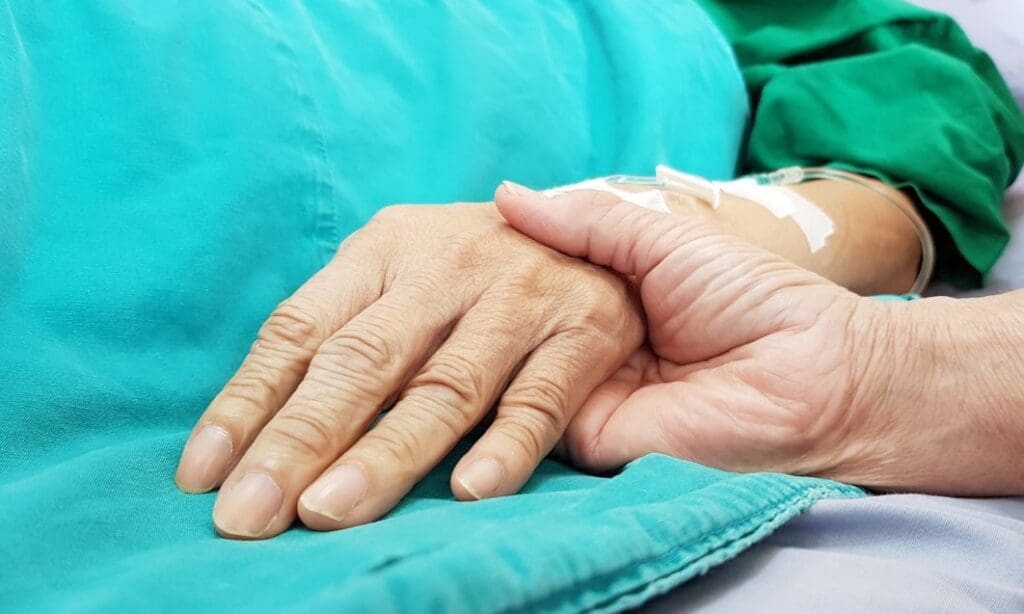Palliative care is put into place to help focus on symptom control, quality of life, emotional support, and advanced care planning for an individual with a chronic disease.
A palliative care plan does not mean that death is imminent. A person can have palliative care at any stage of their illness when a cure cannot be found or it is life-affecting.
While it’s better to put a palliative care plan in place earlier, the choice is entirely down to the individual.
Continue reading to discover the palliative care stages so that you or a loved one are fully prepared. IP Live-in Care can provide a carer at any stage, offering different types of care services.
1. Creating a Personal Care Plan

Palliative care services focus on you as an individual, not just your terminal illness and any symptoms you may have.
There’s a good chance you’ll receive care from a wide range of health and social care professionals. These are often referred to as an interdisciplinary team. However, a live-in carer will be there for you 24/7 and work with the health team to ensure appropriate and optimum care.
When creating a personal care plan, the health professionals taking care of you should support your wishes, so you must tell them directly what you’d like regarding care. Your plan should consist of the following:
- Any current and future treatment.
- The expected evolution of your illness.
- Essential medication.
- Your care preferences. For example, you may prefer to receive care at home, which is where live-in, palliative carers can help.
24/7 care within your home will mean you won’t have the restrictions of a hospital. Your carer can help with household tasks as well as provide specialised and private palliative care in an environment where you feel comfortable and safe.
A palliative carer can be there as and when needed, whether short-term or long-term.
2. Emotional Support and Care

Getting the right emotional support and care is necessary if you’ve been diagnosed with a chronic disease.
Depending on your requests made and agreed upon in stage one, professionals will work together to provide emotional, mental, and physical support to help you have a better quality of life and prepare for what’s to come.
With a 24/7 carer, you can talk about your feelings and emotions in a safe place. This can help you manage any anxieties you have about what you’re experiencing and how it’s affecting you and your loved ones.
Furthermore, a live-in carer can provide emotional support to others affected, such as your family and friends. Equally, they can alleviate family members’ responsibilities and duties, such as cooking and cleaning, giving them respite.
3. Symptom Management

Your GP and other healthcare professionals will continuously look at your care plan to help you stay as independent as possible for as long as possible.
A live-in carer can liaise with these professionals, providing valuable information to help ensure continuity of care.
A palliative carer will keep accurate records of your condition, any changes in symptoms and the care provided. They will also discuss when to add end-of-life medications to your care plan.
Remember, a carer is there to improve your quality of life, particularly during difficult times.
If you have mobility issues, they can advise on adaptations within your home, ensuring you have the necessary aids to move around, such as rails, ramps, and temperature control mixer taps. Government funding may be available to assist financially with these changes.
If you become bedridden, they will ensure you’re comfortable, repositioning you regularly to prevent bedsores.
They may arrange for you to get an adjustable bed and even oxygen cylinders or nebulisers if you’re short of breath.
During the later stages, you may struggle with eating or swallowing. A live-in carer will ensure appropriate nutrition and hydration, which may involve adapting a diet to suit your preferences and capabilities.
4. End-of-Life Care

In this stage, your healthcare team helps you plan permanent, late-stage care. Often, the discussion of hospice care takes place. If you choose to stay at home, your live-in carer will continue to adapt to provide appropriate care.
You may be encouraged to finalise your will and let family and friends know of any other wishes you have. You cannot be forced to do this; if you choose not to, they must respect your wishes.
A carer will carry out any other wishes and create a comfortable, soothing environment with attention to lighting, noises and your personal preferences.
They will respect your autonomy and dignity in decision-making, including decisions about the level of medical intervention and end-of-life preferences.
5. Support of Family and Friends

Death can have a significant impact on those close to you, and in the latter stages, the focus of the palliative care plan will adjust to support your family and friends.
A live-in carer can provide counselling and emotional support to you and your family members. They can provide information about the process of dying and what to expect.
This stage can last as long as needed, sometimes up to a year.
Why is Palliative Care Important?
Having a terminal illness can affect you in many ways. Palliative care provides continuous, personalised support, focuses on improving your overall well-being, and addresses physical, emotional, and spiritual needs.
Supporting you with wishes to remain at home ensures comfort, familiarity and dignity, fostering emotional connections with loved ones and a sense of control during a challenging time.
As mentioned, palliative care can start at any stage, but the earlier it is in place, the better for you and your loved ones. Contact us here at IP Live-in Care today to learn how our carers can provide specialised support and optimum comfort, alleviate tasks, and, ultimately, improve your quality of life.